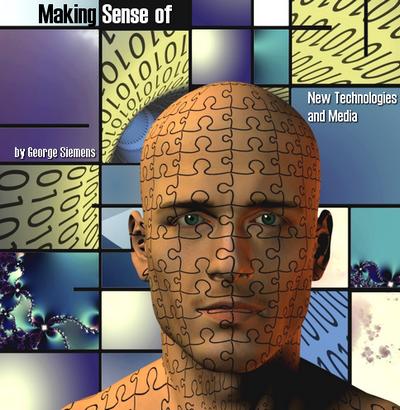 Photo credit: Bruce Rolff
This is why I value and recommend you so much the ongoing
research work by Dr Siemens, who sifts through hundreds of potentially interesting content, video and lectures to cherry-pick those illuminating resources that can help you expand your media and new technology making sense puzzle.
Educational technologies, elearning and new media scholar George Siemens takes you into another great journey into the stories, news and people that can best help you understand the technology
revolution taking place.
Here the details:
Photo credit: Bruce Rolff
This is why I value and recommend you so much the ongoing
research work by Dr Siemens, who sifts through hundreds of potentially interesting content, video and lectures to cherry-pick those illuminating resources that can help you expand your media and new technology making sense puzzle.
Educational technologies, elearning and new media scholar George Siemens takes you into another great journey into the stories, news and people that can best help you understand the technology
revolution taking place.
Here the details:
eLearning Resources and News
learning, networks, knowledge, technology, trends by George SiemensGenerations of Mind Mapping
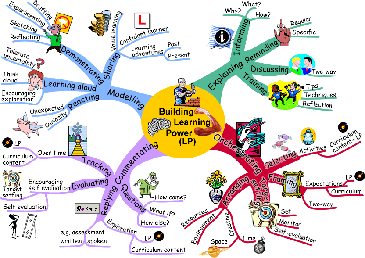 Mind maps (and their next of kin, concept maps) are great tools to draw out ideas, demonstrate connections, and to brainstorm. The next generation of mind mapping - according this article - is a shift from "an organisation method to a collaboration tool." Mind/concept maps fit under the broad umbrella of visual thinking.
Visual thinking is an intuitive, but not frequently referenced concept. Much of our thinking is done in images and yet much of our intact of information is textual. As the web moves from text to images to video, it will be interesting to see if visual thinking grows in popularity.
Mind maps (and their next of kin, concept maps) are great tools to draw out ideas, demonstrate connections, and to brainstorm. The next generation of mind mapping - according this article - is a shift from "an organisation method to a collaboration tool." Mind/concept maps fit under the broad umbrella of visual thinking.
Visual thinking is an intuitive, but not frequently referenced concept. Much of our thinking is done in images and yet much of our intact of information is textual. As the web moves from text to images to video, it will be interesting to see if visual thinking grows in popularity.
History of Mobile Phones
Teemu Arina provides a link to a video on the history of mobile phones. Scary thing is I remember each stage of development. The first mobile phone I ever held had a value of $2500 (I believe) and weighed just shy of ten pounds. Ah, but then came the days of Star Tac. I thought we had the hit pinnacle of technological advancement. At the time, I simply could not conceive how we could innovate beyond that stage. But that's because I was thinking that the main purpose of a mobile phone was to make calls. In early 2000, the mobile phone became less about calling others and more about sharing images, media, and music. Today, I look at the iPhone and have a similar sense of "well, that's that. We can't innovate past this". But, as Teemu states, "The future of mobile phones is perhaps… not a mobile phone at all, but rather a contextually aware and active mobile magic wand. It’s not about skins anymore. Not even about features, open source, multi-touch or iPhoney. It’s about who is going to make the device interact with your environment as well as capturing it in context."Many Eyes and Data Visualization
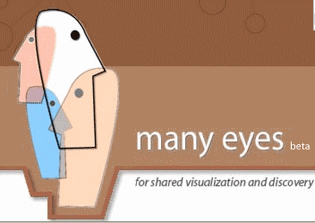 I love Many Eyes - a data visualization site. As a service, I have little doubt it has a bright future. We'll continue to hear more about visualization as we continue to be inundated with information. If you're new to how Many Eyes works, have a look at these short tutorials.
I love Many Eyes - a data visualization site. As a service, I have little doubt it has a bright future. We'll continue to hear more about visualization as we continue to be inundated with information. If you're new to how Many Eyes works, have a look at these short tutorials.
Social Media Disasters
 Open environments - or at minimum, environments where everyone potentially has a voice - function by different rules than closed environments. We've seen this in fields such as news, video, music, and journalism. We're also seeing it in the marketing and public relations fields. The fully pre-packed, centralized, company-shaped public image is now augmented by images posted to flickr and videos posted on YouTube.
An organization no longer solely shapes its reputation. The myriad of bloggers, podcasters, youtubers, facebookers, and twitterers contribute significantly to reputation of a company. William Dutton calls this networked group the fifth estate: "Essentially, the Internet is enabling people to network with other individuals and with a vast range of information, services and technical resources. This is being achieved in ways that can support greater accountability not only in government and politics, but also in other sectors. I will argue that this could be as important – if not more so – to the 21st century as the Fourth Estate has been since the 18th. "
Social Media Disasters provides numerous examples of companies that have not yet succeeded in transitioning to participation in an open market of reputation creation.
Open environments - or at minimum, environments where everyone potentially has a voice - function by different rules than closed environments. We've seen this in fields such as news, video, music, and journalism. We're also seeing it in the marketing and public relations fields. The fully pre-packed, centralized, company-shaped public image is now augmented by images posted to flickr and videos posted on YouTube.
An organization no longer solely shapes its reputation. The myriad of bloggers, podcasters, youtubers, facebookers, and twitterers contribute significantly to reputation of a company. William Dutton calls this networked group the fifth estate: "Essentially, the Internet is enabling people to network with other individuals and with a vast range of information, services and technical resources. This is being achieved in ways that can support greater accountability not only in government and politics, but also in other sectors. I will argue that this could be as important – if not more so – to the 21st century as the Fourth Estate has been since the 18th. "
Social Media Disasters provides numerous examples of companies that have not yet succeeded in transitioning to participation in an open market of reputation creation.
Learning Environment Connector
 Blackboard is taking a page out of Google's Android and Open Social textbooks in announcing Learning Environment Connector:
Blackboard is taking a page out of Google's Android and Open Social textbooks in announcing Learning Environment Connector: "Imagine a world where students go to a single URL and connect to their course regardless of which course management system it is hosted on. Dashboards consolidate information for users from these many systems. Administrators easily access accounts and information across these systems; thus simplifying helpdesk operations. The Learning Environment Connector makes this world possible."The approach of using openness as a competitive leverage point works for Google as they have the trust and respect of their users. Blackboards lawsuit antics over the last few years have significantly damaged its reputation in the eyes of users. Perhaps developers will be more forgiving.
Wesch on Media Literacy and Such
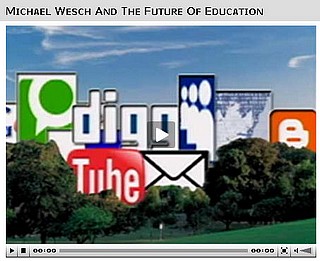 Mid-June, Michael Wesch presented at University of Manitoba. The recording of his presentation is now available.
Mid-June, Michael Wesch presented at University of Manitoba. The recording of his presentation is now available.
Education for a Digital World
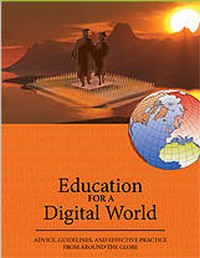 BC Campus and Common Wealth of Learning are offering a free download of their book Education for a digital world (the book can also be purchased). The book covers significant topics, including: impact of instructional technology, implementing technology, preparing online courses, e-learning in action, and engagement and communication.
BC Campus and Common Wealth of Learning are offering a free download of their book Education for a digital world (the book can also be purchased). The book covers significant topics, including: impact of instructional technology, implementing technology, preparing online courses, e-learning in action, and engagement and communication.
Originally written by George Siemens and published as weekly email digest on eLearning Resources and News. First published on July 3rd 2008.
 To learn more about George Siemens and to access extensive information and resources on elearning check out www.elearnspace.org. Explore also George Siemens connectivism site for resources on the changing nature of learning and check out his new book "Knowing Knowledge".
To learn more about George Siemens and to access extensive information and resources on elearning check out www.elearnspace.org. Explore also George Siemens connectivism site for resources on the changing nature of learning and check out his new book "Knowing Knowledge".

